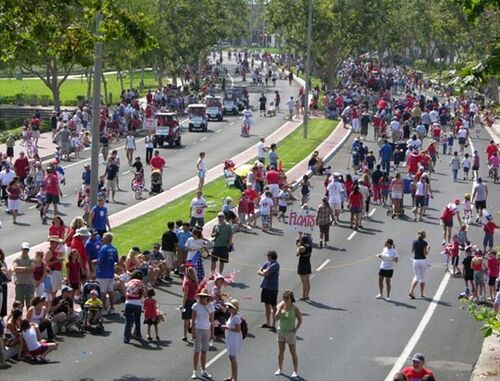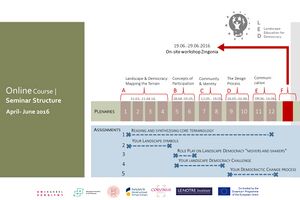Seminar Landscape Education for Democracy 2016: Difference between revisions
No edit summary |
m (Protected "Seminar Landscape Education for Democracy 2016" ([Edit=Allow only administrators] (indefinite) [Move=Allow only administrators] (indefinite))) |
||
| (8 intermediate revisions by the same user not shown) | |||
| Line 1: | Line 1: | ||
[[File:LED street crowd.jpg|thumb|500px|image: Deni Ruggeri]] | [[File:LED street crowd.jpg|thumb|500px|image: Deni Ruggeri]] | ||
''' | '''This page documents the fist LED online seminar which was organised from March - June, 2016 by the LED partners''' | ||
== Introduction == | == Introduction == | ||
| Line 16: | Line 11: | ||
*'''[https://ilias.hfwu.de/goto.php?target=file_13995_download&client_id=hfwu Project Presentation (PPT)]''' | *'''[https://ilias.hfwu.de/goto.php?target=file_13995_download&client_id=hfwu Project Presentation (PPT)]''' | ||
== Course schedule and content for 2016 == | == Course schedule and content for 2016 == | ||
| Line 31: | Line 27: | ||
*Communication and representation | *Communication and representation | ||
For further details please visit the '''[[LED_Online_Seminar_Schedule_2016|seminar schedule]].''' | For further details please visit the '''[[LED_Online_Seminar_Schedule_2016|seminar schedule 2016]].''' | ||
*' | == Seminar lectures and recordings == | ||
* | *Lecture recordings and presentation materials are available open access via HfWU's ILIAS platform | ||
*An overview of recordings can be accessed '''[https://ilias.hfwu.de/goto.php?target=cat_14575&client_id=hfwu here]''' | |||
*''' | == Assignments == | ||
* Active seminar participants completed a series of five assignments in order to translate the courses' theoretical and methodical knowledge to their local landscapes | |||
*More information can be found on the '''[[LED_Online_Seminar_Assignments_2016|seminar assignments page]]''' | |||
== | == Working Groups == | ||
*Participants worked in international teams on their assignments and all outcomes have been documented on working group pages | |||
*See the global distribution of our participants on this [https://www.zeemaps.com/map?group=1926951 interactive map] | |||
*Please visit the '''[[LED_Online_Seminar_Working_Groups_2016|2016 working group pages]]''' for further details | |||
== Intensive Programme 2016 - Zingonia == | |||
* | * The online seminar was followed by an intensive study programme in Zingonia, Italy | ||
* | * Further details on this learning activitiy can be found in the '''[[LED_Workshop_Zingonia_2016|Zingonia documentation]]''' | ||
== 2016 Seminar Minutes == | |||
*If you wish to read about our process in the seminar and the working groups please visit the '''[[LED_Online_Seminar_Minutes_2016|2016 seminar minutes]]''' | |||
== About the partnership == | == About the partnership == | ||
Latest revision as of 15:22, 12 December 2016
This page documents the fist LED online seminar which was organised from March - June, 2016 by the LED partners
Introduction
The landscape belongs to everyone. We should all have equal access to it and a voice in how it is used valued and maintained. However, spatial planning education rarely includes considerations of democratic processes, participatory planning, community design and landscape stewardship. Furthermore, it does not fully prepare young practioners to become leaders in promoting democratic landscape change and work effectively in partnership with communities.
The idea behind the LED (Landscape Education for Democracy) project, a partnership between 5 European landscape architecture faculties and the LE:NOTRE Institute is to promote awareness and empower young design and planning professional to become more active in shaping democratic change. The project employs interdisciplinary, problem-based learning environments and curricular innovation to introduce landscape and democracy as a cross-disciplinary subject. Our goal is to fill a gap in design and planning education and give students the opportunity to confront themselves with pressing issues of landscape democracy, right to the landscape and participation.
The first LED course starts this spring featuring a 12 online course sessions available to students at any institution, as well as a two-week summer on-site intensive programme available only to students at partner universities.
Course schedule and content for 2016
Online seminar: April-June
The online module consists of twelve 90-minute sessions of lectures, reading materials, collaborative group work, concept mapping, storyboarding and other diverse active and passive learning tools.
Themes covered in the course are:
- Landscape and democracy
- Participation theories and practices
- Community and identity
- The design process
- Communication and representation
For further details please visit the seminar schedule 2016.
Seminar lectures and recordings
- Lecture recordings and presentation materials are available open access via HfWU's ILIAS platform
- An overview of recordings can be accessed here
Assignments
- Active seminar participants completed a series of five assignments in order to translate the courses' theoretical and methodical knowledge to their local landscapes
- More information can be found on the seminar assignments page
Working Groups
- Participants worked in international teams on their assignments and all outcomes have been documented on working group pages
- See the global distribution of our participants on this interactive map
- Please visit the 2016 working group pages for further details
Intensive Programme 2016 - Zingonia
- The online seminar was followed by an intensive study programme in Zingonia, Italy
- Further details on this learning activitiy can be found in the Zingonia documentation
2016 Seminar Minutes
- If you wish to read about our process in the seminar and the working groups please visit the 2016 seminar minutes
About the partnership
Grant holder and coordinator
- NMBU, Norwegian University of Life Sciences, Department of Landscape Architecture and Spatial Planning
Project partners
- Nürtingen-Geislingen University, Nürtingen, Germany
- University of Kassel School of Architecture, Urban and Landscape Planning, Kassel, Germany
- Szent István University, Faculty of Landscape Architecture, Budapest, Hungary
- University of Bologna, Department of Architecture, Italy
- LE:NOTRE Institute, an international foundation based in Wageningen, Netherlands.
ERASMUS+ Strategic Partnership Programme


